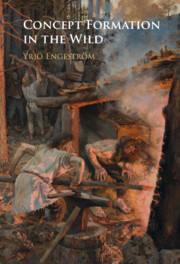Book contents
- Concept Formation in the Wild
- Concept Formation in the Wild
- Copyright page
- Dedication
- Contents
- Figures
- Tables
- Preface
- Chapter 1 Introduction
- Chapter 2 Theorizing Concept Formation in the Wild
- Chapter 3 Theorizing Concept Formation in the Wild
- Chapter 4 Functional Concepts in Organized Productive Activities
- Chapter 5 Embodied Germ Cell at Work
- Chapter 6 Double Stimulation and Concept Formation in Everyday Work
- Chapter 7 Collective Concept Formation as Creation at Work
- Chapter 8 Concept Formation over the Long Haul
- Chapter 9 Consequences of Concept Formation in the Wild
- References
- Index
Chapter 1 - Introduction
Locating Concept Formation in the Wild
Published online by Cambridge University Press: aN Invalid Date NaN
- Concept Formation in the Wild
- Concept Formation in the Wild
- Copyright page
- Dedication
- Contents
- Figures
- Tables
- Preface
- Chapter 1 Introduction
- Chapter 2 Theorizing Concept Formation in the Wild
- Chapter 3 Theorizing Concept Formation in the Wild
- Chapter 4 Functional Concepts in Organized Productive Activities
- Chapter 5 Embodied Germ Cell at Work
- Chapter 6 Double Stimulation and Concept Formation in Everyday Work
- Chapter 7 Collective Concept Formation as Creation at Work
- Chapter 8 Concept Formation over the Long Haul
- Chapter 9 Consequences of Concept Formation in the Wild
- References
- Index
Summary
The three initial sources of this book are a Marxist dialectical theory of concepts, an emphasis on the collective and historically evolving nature of concepts, and the turn toward everyday practical activities as legitimate arenas of thinking and conceptualizing. The resources for integrating these sources into a coherent framework come from cultural-historical activity theory and the theory of expansive learning, applied and developed in interventionist studies of various types of work and organizations, from cleaning services to hospitals and courts of law to factories and banks. In recent years, this empirical basis has been broadened to include social movements and societal change efforts championed by broad-based coalitions. The primary focus of this book is on collective creation of culturally new concepts in the wild. The starting point is the realization that culturally novel concepts are not only created by scientists but also by people struggling with persistent problems and challenges in all walks of life. We are all involved in the creation of new concepts. This has been largely omitted by scholars of concept formation. Taking this seriously means that we need to reexamine and perhaps revamp aspects of our basic understanding of concepts.
Keywords
- Type
- Chapter
- Information
- Concept Formation in the Wild , pp. 1 - 7Publisher: Cambridge University PressPrint publication year: 2024



